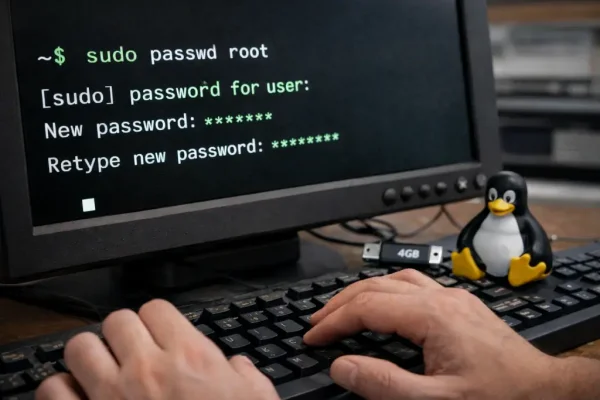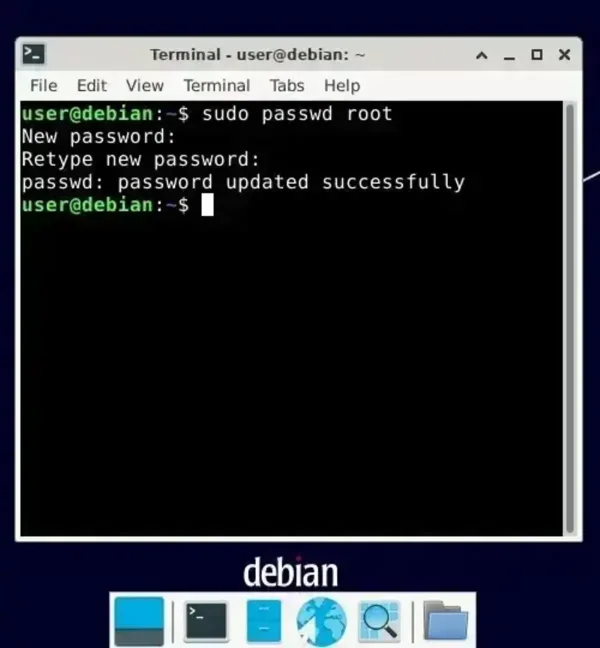What Is the Default Root Password in Linux? Live vs Installed Systems Explained:
Most modern Linux distributions do not ship with a default root password. On Live systems, the root account is typically locked or disabled entirely. Administrative access is instead provided through sudo.

Quick Answer
Short answer: There is usually no default root password in Linux. On most Live USB systems, the root account is locked and administrative access is handled through sudo. Installed systems vary by distribution.
If you are running Linux from a bootable USB drive, this behavior is completely normal.
Why Most Linux Distributions Do Not Have a Default Root Password
Modern Linux distributions disable or lock the root account by default for security reasons. Instead of logging in directly as root, users perform administrative actions using sudo, which:
- Reduces attack surface
- Prevents accidental system damage
- Provides command logging and accountability
- Enforces least privilege security practices
This model is common in Ubuntu, Linux Mint, Debian based Live systems, Fedora, openSUSE, and many others.
Live USB vs Installed System Root Behavior
Root access behaves differently depending on whether you are running a Live environment or an installed system. This distinction is especially important when using tools like YUMI, UUI, Etcher, Rufus, or when configuring persistence.
| Distribution | Environment | Default Root Password | Root Account Status | Admin Access Method |
|---|---|---|---|---|
| Ubuntu | Live | None | Locked | sudo |
| Ubuntu | Installed | None | Locked | sudo (created user) |
| Debian | Live | None | Locked | sudo (if configured) |
| Debian | Installed | Set during install | Active | su - or sudo (if installed) |
| Linux Mint | Live/Installed | None | Locked | sudo |
| Fedora | Live | None | Locked | sudo |
| Arch Linux ISO | Live | User: root Password: none (press Enter) |
Logged in as root | Already root |
| Knoppix | Live | None set | Unlocked | su - |
| Kali Linux | Live | User: kali Password: kali |
Root disabled | sudo |
Knoppix Live Root Behavior
Knoppix behaves differently from Ubuntu and Debian Live systems.
- The root account is unlocked.
- No password is set by default.
- You can become root immediately with:
su -Or:
sudo su -To set a root password while logged in as root:
passwdIf you need to boot into single user mode for maintenance, enter the following at the boot prompt:
knoppix 1This starts the system in runlevel 1 for troubleshooting or recovery tasks.
Important Debian Minimal Install Note
On a base Debian installation, behavior differs from Ubuntu:
- The installer asks you to set a root password.
sudois not installed by default.- You must use:
su -This loads a full root login shell using the password created during installation.
If you are building a custom system, remastering an ISO, or modifying persistence layouts, this distinction matters.
Granting Sudo Rights and Managing the Sudoers List
If a user does not already have sudo privileges, you can grant them root access by adding them to the sudoers list or the sudo group.
See our full guide on how to add a user to the sudoers list for simple instructions.
In many distributions, users in the sudo or wheel group are automatically granted administrative rights. For example, to add a user to the sudo group on Debian and Ubuntu:
sudo usermod -aG sudo usernameReplace username with the actual user account name.
Adding a user to the correct group can prevent errors when running commands like sudo passwd root or filesystem changes.
Why You Might Want to Set a Root Password
While not required in most cases, enabling root can be useful if you need to:
- Perform advanced administrative tasks
- Install or remove core system packages
- Use graphical package managers like Synaptic
- Modify persistence partitions such as
casper-rw - Work in recovery or chroot environments
- Switch directly to root using
su - - Change file permissions using chmod for system files
How to Set or Change the Root Password (Ubuntu and Debian)
- Open a terminal (Ctrl + Alt + T)
- Run:
sudo passwd root- Enter your new password
- Confirm it

This unlocks and enables the root account.
Technical Section: su vs sudo vs sudo -i
Advanced users configuring persistence, modifying boot parameters, or editing system files often need a full root login shell.
sudo -i
sudo -iStarts a root login shell and loads root environment variables. Recommended for most advanced administrative tasks.
su -
su -The su - command switches to root and loads a full login shell. Requires the root password.
sudo su
sudo suSwitches to root but may not fully load the root login environment.
For ISO modification, partition editing, and manual persistence configuration, sudo -i or su - is preferred over plain sudo su.
Kali Linux Root Policy Change
Modern Kali Linux versions use:
- User:
kali - Password:
kali - Root login disabled by default
Older versions previously allowed direct root login. This policy changed to align with modern security best practices.
Frequently Asked Questions
What is the default root password in Linux?
Most Linux distributions do not have a default root password. On Live systems, root is usually locked or disabled.
Does setting a root password persist on a Live USB?
Only if persistence is enabled. Without persistence, changes are lost after reboot.
Why does Debian sometimes require su - instead of sudo?
Minimal Debian installations do not include sudo by default. You must use su - and the root password created during installation.
How do I add a user to the sudoers list?
See our guide on how to add a user to the sudoers list for step-by-step instructions.
Why can I use su - immediately in Knoppix?
Knoppix ships with the root account unlocked and no password set, allowing immediate root access in a Live session.
How do I lock the root account again?
Run:
sudo passwd -l rootThis disables direct root login.
Final Thoughts
There is no universal default root password in Linux. Most modern distributions intentionally disable or lock the root account and rely on sudo for administrative control. You can usually change Linux passwords, if one is already preset.
However, behavior varies across Live systems, installed environments, and distributions like Knoppix or Arch. If you are working with a bootable Linux USB, using persistence, or building a multiboot setup, understanding how root access works can prevent confusion and save time.
